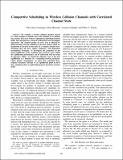| dc.contributor.author | Parrilo, Pablo A. | |
| dc.contributor.author | Candogan, Utku Ozan | |
| dc.contributor.author | Menache, Ishai | |
| dc.contributor.author | Ozdaglar, Asuman E. | |
| dc.date.accessioned | 2010-10-07T15:48:55Z | |
| dc.date.available | 2010-10-07T15:48:55Z | |
| dc.date.issued | 2009-06 | |
| dc.date.submitted | 2009-05 | |
| dc.identifier.isbn | 978-1-4244-4176-1 | |
| dc.identifier.other | INSPEC Accession Number: 10750092 | |
| dc.identifier.uri | http://hdl.handle.net/1721.1/58939 | |
| dc.description.abstract | We consider a wireless collision channel, shared by a finite number of mobile users who transmit to a common base station. Each user wishes to optimize its individual network utility that incorporates a natural tradeoff between throughput and power. The channel quality of every user is affected by global and time-varying conditions at the base station, which are manifested to all users in the form of a common channel state. Assuming that all users employ stationary, state-dependent transmission strategies, we investigate the properties of the Nash equilibrium of the resulting game between users. While the equilibrium performance can be arbitrarily bad (in terms of aggregate utility), we bound the efficiency loss at the best equilibrium as a function of a technology-related parameter. Under further assumptions, we show that sequential best-response dynamics converge to an equilibrium point in finite time, and discuss how to exploit this property for better network usage. | en_US |
| dc.description.sponsorship | United States. Defense Advanced Research Projects Agency (ITMANET program) | en_US |
| dc.language.iso | en_US | |
| dc.publisher | Institute of Electrical and Electronics Engineers | en_US |
| dc.relation.isversionof | http://dx.doi.org/10.1109/GAMENETS.2009.5137452 | en_US |
| dc.rights | Article is made available in accordance with the publisher's policy and may be subject to US copyright law. Please refer to the publisher's site for terms of use. | en_US |
| dc.source | IEEE | en_US |
| dc.title | Competitive scheduling in wireless collision channels with correlated channel state | en_US |
| dc.type | Article | en_US |
| dc.identifier.citation | Candogan, U.O. et al. “Competitive scheduling in wireless collision channels with correlated channel state.” Game Theory for Networks, 2009. GameNets '09. International Conference on. 2009. 621-630. ©2009 Institute of Electrical and Electronics Engineers. | en_US |
| dc.contributor.department | Massachusetts Institute of Technology. Department of Electrical Engineering and Computer Science | en_US |
| dc.contributor.department | Massachusetts Institute of Technology. Laboratory for Information and Decision Systems | en_US |
| dc.contributor.approver | Parrilo, Pablo A. | |
| dc.contributor.mitauthor | Parrilo, Pablo A. | |
| dc.contributor.mitauthor | Candogan, Utku Ozan | |
| dc.contributor.mitauthor | Menache, Ishai | |
| dc.contributor.mitauthor | Ozdaglar, Asuman E. | |
| dc.relation.journal | International Conference on Game Theory for Networks, 2009. GameNets '09 | en_US |
| dc.eprint.version | Final published version | en_US |
| dc.type.uri | http://purl.org/eprint/type/JournalArticle | en_US |
| eprint.status | http://purl.org/eprint/status/PeerReviewed | en_US |
| dspace.orderedauthors | Candogan, Utku Ozan; Menache, Ishai; Ozdaglar, Asuman; Parrilo, Pablo A. | en |
| dc.identifier.orcid | https://orcid.org/0000-0002-1827-1285 | |
| dc.identifier.orcid | https://orcid.org/0000-0003-1132-8477 | |
| mit.license | PUBLISHER_POLICY | en_US |
| mit.metadata.status | Complete | |
